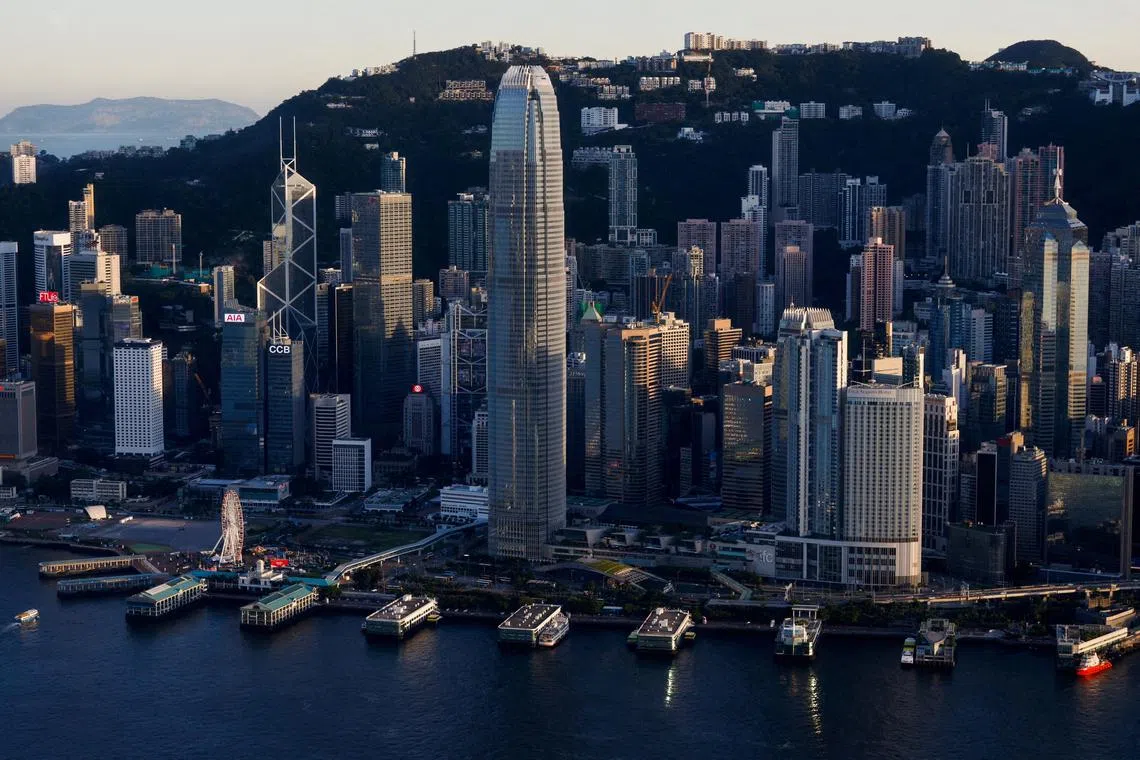Is Hong Kong really over? Its govt disputes US economist’s controversial view
Sign up now: Get insights on Asia's fast-moving developments

Hong Kong’s economy grew 2.7 per cent in the first quarter of 2024 compared with a year ago.
PHOTO: REUTERS
Follow topic:
HONG KONG – A war of words has ensued between the Hong Kong government and US economist Stephen Roach, after the former Morgan Stanley Asia chairman gave a speech on June 5 on his assessment of the city’s future.
Mr Roach, now a senior research scholar at the Paul Tsai China Centre of Yale Law School, had in February created waves after he published an opinion piece in the Financial Times controversially headlined “It pains me to say Hong Kong is over”.
On June 5, in a speech at the Foreign Correspondents’ Club in Hong Kong a day after the 35th anniversary of China’s Tiananmen crackdown, Mr Roach doubled down on his pronouncement of the Asian financial hub’s certain demise.
Expanding on the premise of his opinion piece, Mr Roach said that “without a rebound in the mainland Chinese economy, Hong Kong is unlikely to spring back to life on its own... because the linkages between the PRC (People’s Republic of China) and Hong Kong economies have become tighter than ever”.
“The Hong Kong economy has effectively been swallowed up by the mainland economy – hook, line and sinker,” the economist said, touting data showing the trajectory of both economies’ growth rates to support his argument.
“With the Chinese economy likely to underperform over the foreseeable future... I am afraid the same is likely to be the case for Hong Kong... For the Hong Kong economy, resilience without China will be all but impossible to achieve.”
Stressing that the contentious title of his article was intended as “a wake-up call” for Hong Kong, Mr Roach added: “Like it or not, Hong Kong’s dynamism, its energy and its independence are now in flux. You cannot afford to take your city’s seemingly innate resilience for granted. That is what is over.”
Hong Kong’s economy grew 2.7 per cent in the first quarter of 2024 compared with a year ago. Annual gross domestic product (GDP) in 2023 rebounded less than expected to 3.2 per cent, after a 3.7 per cent contraction in 2022, when the city was closed to most of the world during the Covid-19 pandemic.
The Hong Kong government hit back quickly later that night in a 1,500-word statement titled “Let data and facts speak for Hong Kong’s bright future”.
In its statement that omitted mentioning Mr Roach by name, the government said that remarks by “some individuals” had “clearly overlooked the existing advantages and the current positive development momentum of Hong Kong”.
“Despite the fact that the external environment will remain complicated, the mainland and Hong Kong’s economic growth is steadily improving, and even at a faster pace than some developed economies,” read the statement peppered with data to back up its points.
“Hong Kong’s stock market capitalisation and size of assets under management are both equivalent to 10 to 11 times of Hong Kong’s GDP. This has reflected that capital and investors have cast a vote of confidence in the steady development and bright prospects of Hong Kong’s market.”
Mr Roach, reacting to the government’s response after returning to the United States the following day, said the statement demonstrated a “worrisome sense of denial”.
“The government’s response is sadly predictable – unwilling to debate the core issues I have raised about tight economic linkages between Hong Kong and a growth-challenged Chinese economy,” he wrote on X, formerly known as Twitter.
Veteran Hong Kong affairs commentator Willy Lam said that he saw Mr Roach’s arguments as “a very basic fact-based assessment”, but that the government was obliged to mount a strong defence of Hong Kong in the face of such criticism by reputable foreign business people.
“The government understands that these strong rebuttals do not serve much purpose, but Beijing has given them instructions to put up a spirited defence not unlike the style of wolf warrior diplomacy that Beijing itself adopts,” Dr Lam, a senior fellow at Washington-based The Jamestown Foundation, told The Straits Times.
Dr Lam was referring to China’s dominant diplomatic strategy over the past decade that involves officials taking a more assertive and often confrontational stance in engagement.
“But it is true... many of the factors that made Hong Kong into an international trading hub are no longer present,” the academic said. “In terms of Hong Kong’s long-term prospects, when we look at data such as container throughput, IPO (initial public offering) activity, occupancy and prices of the top commercial buildings and new apartments, we do see a city clearly in decline.”
The war of words between the Hong Kong government and Mr Roach comes the same week that two prominent British judges resigned from the top court
The resignations of Lord Lawrence Collins and Lord Jonathan Sumption from the Court of Final Appeal came after 14 pro-democracy activists were on May 30 found guilty of subversion in a landmark national security case.
Their departure adds to the number of foreign judges who have severed their ties to the highest court in recent years following Beijing’s 2020 imposition of a national security law on Hong Kong.
Executive Council member and barrister Ronny Tong told local newspaper South China Morning Post that it was “most unfortunate that these judges finally appeared to succumb to what I believe to be immense pressure from the UK”.
Hong Kong political commentator Johnny Lau told ST that the two incidents – the controversy over Mr Roach’s comments and the British judges’ resignations – were more hits to Hong Kong’s declining image in the eyes of foreigners both in and outside the city.
“These incidents undoubtedly affect Hong Kong’s image,” Mr Lau said.
“They reflect the gradual, growing sense of disappointment and dismay that some observers feel with regard to Hong Kong’s future.”


